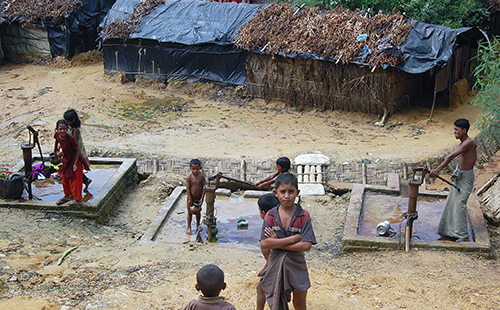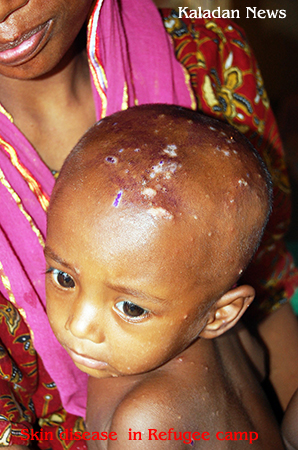Rohingya refugee children living in the unregistered Kutupalong camp face major health risks, said a camp leader who asked not to be named...
Kutupalong, Bangladesh: Rohingya refugee children living in the unregistered Kutupalong camp face major health risks, said a camp leader who asked not to be named.
 “Most children are suffering from malaria, diarrhea, pneumonia, fever and skin diseases,” the camp leader said.
“Most children are suffering from malaria, diarrhea, pneumonia, fever and skin diseases,” the camp leader said.
He blamed the spread of disease on poor sanitation resulting from bad drainage in the camp, which he said was supervised by the NGO, Action Against Hunger, known internationally as Action Contra la Faim, or ACF International.
The camp leader said he had complained to ACF about blocked drainage and requested the spraying of insecticide to kill mosquitoes and other disease-bearing pests, the group said they were barred from helping by Bangladesh authorities.
“But if any high officer from ACF visited the camp, field workers would clean the drains and spray medicine,” said camp resident Mohamed Anno. “It only depends on the field officers and staff.”
He added that there were more than 100 children suffering from various diseases in the unofficial camp.
 Officials from the ACF distributed soap to camp residents more than six months ago under a program to promote better hygiene through hand-washing. However, the program has been continued in local villages near the camp.
Officials from the ACF distributed soap to camp residents more than six months ago under a program to promote better hygiene through hand-washing. However, the program has been continued in local villages near the camp.
One camp resident identified only as Anowara, said an officer from ACF told refugees in at Kutupalong that the group had no funds to continue the program at the camp.
Meanwhile, Médecins Sans Frontières, or MSF Holland, has been providing health services to local villagers and Kutupalong camp residents, but local villagers have been given priority care, according to one camp resident suffering from malaria.
“We wait for treatments in the MSF clinic, but the staffs give first priority to local villagers, and the refugees have to wait until later.”
Rohingya refugees living in the unofficial Kutupalong camp get no other outside assistance except what has been available through ACF and MSF Holland, said a member of a refugee watchdog group near the Burmese border, adding that both groups have become unwilling to continue assistance.
More than 40,000 refugees live in makeshift huts with plastic sheeting for roofs. They are largely confined to the camp and are prohibited from leaving to find work.


